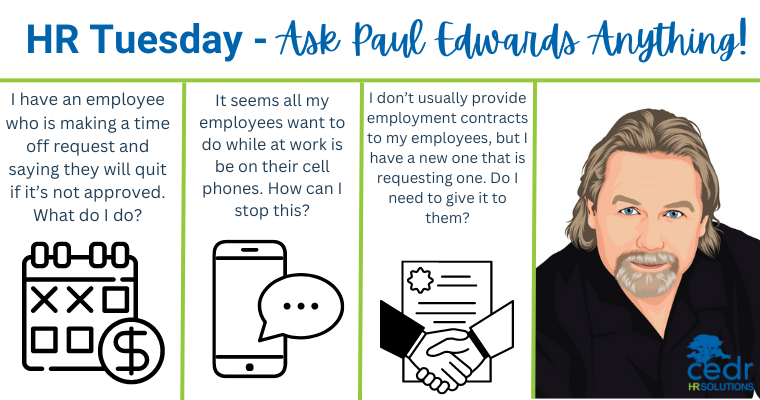My Employee is Giving Me An Ultimatum… HR AMA With Paul Edwards (June 2023)

Hello AADOM Tribe! Welcome back to the monthly LIVE Ask Me Anything with Paul Edwards, CEDR CEO & Founder, and Heather Colicchio, founder and president of AADOM. Throughout the upcoming year, you can submit HR issues that are happening right now in your practice to Paul and CEDR’s team of HR professionals for them to answer. Our team will pick from the dozens that are being submitted and choose several to give guidance on in our Monthly HR Article. Then, Paul and Heather will expand on the written answers during every HR Tuesday Livecast. To submit your questions, click here!
For the in-depth, expanded, and detailed answers …
Listen to HR Tuesdays live, mark your calendar for the second Tuesday of each month, or check out the archived recordings here.
We understand that all your daily human resource issues likely have some state, federal, or local employment laws that you must comply with while, at the same time, you want to find the best human way to solve the core problem. We will address the legal and human aspects in this series and help you devise some great resolutions.
Here are three of your best submissions this month:
- I have an employee making a time off request and saying they will quit if it’s not approved. What do I do?
- It seems all my employees want to do while at work is be on their cell phones. How can I stop this?
- I don’t usually provide employment contracts to my employees, but I have a new one requesting one. Do I need to give it to them?
Let’s get to your questions
Question: An employee of ours requested to leave work early for childcare-related reasons every day for more than a month during the busiest time of day for our office. The employee told me they would have to leave at the requested time whether or not their request was approved, and I don’t know what to do in this situation. We’re already short-staffed as it is.
The legal side of things: This is a challenging situation, and we recognize that it does not feel good for an employer to be given an ultimatum by your employees.
In most situations, you aren’t going to be required to provide this type of time off, but be sure you know about your state’s laws and are clear on the reason for the employee’s time off “request.”
Lack of childcare rarely gives an employee a protected right to take time off, making this a purely personal time-off request that you can grant. There are some limited circumstances where childcare needs may be protected by state law, such as caring for a sick child, taking a child to a doctor’s appointment, attending a parent-teacher conference, etc. Those situations clearly contrast something like the child’s babysitter being on vacation.
Now for the human approach: On the one hand, you have to balance the needs of your practice and your patients and, on the other hand, you risk losing a potentially valuable employee if you find yourself unable or unwilling to work with them to provide the time off for which they’ve asked.
Still, it’s one thing to try to accommodate the employee’s request and quite another to essentially be told they’ll be walking off the job regardless of what you say. That ultimatum needs to be addressed, even if you can allow her to leave early, as this employee is telling you that she is not committed to her work schedule.
The employee needs to know that working their scheduled hours is the bare minimum of being part of your team. Their saying they’re not coming in is a huge red flag for you. You can acknowledge that childcare is important, and they may have been highly stressed about it when they said that, but to continue being part of the team, you need to know you can rely on them not to walk out and abandon the team and practice.
To keep things in balance, be fair to your business and the employee, and try brainstorming on a solution with the employee. On her end, has she explored all her options for getting childcare? A coworker may have a high-school-aged child who could babysit. Can the schedule be adjusted so you can cover this employee when she needs to be off? Is reducing her to part-time hours for the summer feasible?
Regardless of which direction you choose to go with this, we recommend having a documented conversation about the ultimatum situation. This could be either a written corrective action or an informal conversation. You can use CEDR’s free Corrective Action Form…Click to learn more in a new tab… or the Employee Interaction Log…Click to learn more in a new tab… to document your chosen route.
Still, to get this right for your specific business and unique situation, as HR experts…Click to learn more in a new tab…, we would need to consider several factors – including what kind of protected leave may or may not be available – and then work to document her request and, frankly, the threat to leave anyway if it is not approved.
Question: It seems that all of my front desk staff needs to be on their personal cell phones every chance they get, even sometimes while a patient is walking to the counter. I don’t want to take the phones away. I know that in this day and age, everyone feels better when they can be contacted at work in case of emergencies. But it is getting out of hand, and I am unsure what to do.
The legal side of things: Your employee handbook should definitely address the use of cell phones directly (all CEDR employee handbooks contain customized, legally compliant cell phone and social media policies)…Click to learn more in a new tab…. But writing a legally compliant cell phone policy is tricky and should be left to experts because of several laws that address protections related to employee communications and other things.
The good news is that your reaction is not to start banning cell phones or smartwatch use during the workday – since a policy like that would actually violate federal law…Click to learn more in a new tab….
Cell phone policies could occupy several pages of discussion on their own but suffice it to say that if you have a policy in place that prohibits the use of cell phones outright, you may have a legal vulnerability on your hands and should reach out to CEDR to have your handbook updated.
Now for the human approach: Having an employee scrolling through social media on their phone all day is not okay. Wagging your finger at someone and saying, “Stop being on your phone all the time!” is likely to be met by an extreme eye roll and them just trying to hide it better. We understand how frustrating this can be as an employer, especially when phones are so integrated into our daily lives.
If an employee’s performance is being impacted by their cell phone, you can and should address that. Instead of focusing on the cell phone as the enemy, focus on its impact – they are attending to personal matters in a way that causes their work to suffer. This is where the FIRR method…Click to learn more in a new tab… comes in handy.
“FIRR” stands for “Fact, Impact, Reason, Request.” Breaking that down further to address the cell phone issue takes the following shape:
- Fact: “Today, I observed you texting for several minutes while a patient was waiting to be returned to the operatory.”
- Impact: “By attending to personal matters, you were not attending to your job responsibilities, and the patient was upset that their appointment ended up running later than expected. They complained to our front desk team about this, so they had to make excuses for the situation to try to keep the patient.”
- Reason: “We are talking to you about this because being distracted by texting when with a patient causes all types of issues and is causing delays in your work, which impacts the patients and the entire team.”
- Request: “Moving forward, I need you to pay closer attention to whether the patient is ready to be brought back, and non-emergency personal matters need to wait.”
When employees express that they need their cell phones in case someone reaches out to them in the event of an emergency, encourage your employees to have those communications directed to the office rather than their cell phones.
Do you have an HR question for Paul? Submit your HR questions for Paul to discuss on the next HR Tuesday LiveCast here!
Question: My practice is in Illinois, and I have 12 employees. Recently, I hired someone new that says all of her past jobs have given her employment contracts, which we don’t usually do here. However, she is requesting one. Do I have to have one drawn up for her?
The legal side of things: The law in every state except for Montana makes all employees “at-will”…Click to learn more in a new tab… unless the employer changes that status. At-will employment allows the employer to terminate employees at any time without cause, explanation, or prior warning, provided it does not violate state and federal anti-discrimination laws. Employees don’t need to sign anything to create an at-will relationship.
Without going deep into a rabbit hole, only you can change that condition from at will to something else. It can happen when folks start writing policies or creating agreements independently…Click to learn more in a new tab… without understanding how that might occur. This is another reason why it’s so important to ensure a qualified HR expert crafts your employee handbook…Click to learn more in a new tab….
Now for the human approach: First, you would want to find out why they want an agreement. Typically it’s the employer asking the employee to sign an agreement, not the other way around.
There are misconceptions out there that all employees should have a contract, that the employee should be signing that they agree to the terms of their offer letter, that they should agree to their job description and more. None of those things are true.
Having an employee sign a contract should be the exception, not the rule. Turning an offer letter or job description…Click to learn more in a new tab… into an “agreement,” makes it unnecessarily difficult for the employer to make changes later.
In most cases where an employee is asking, they are trying to get something in writing from their employer that would protect their job for a period of time. Basically, they are trying to get their employer to change their “at-will” status, making it much harder to fire them.
We’ve worked with plenty of employers who want to require that their employees give them advance notice if they’re leaving or want their employees to agree to work there for at least a year. This often backfires when the employer wants to fire the employee, but their own agreement bars them from doing so as it changes the at-will status. So, instead, they have to tell an employee they are being terminated yet allow them to continue working there for a period of time. It should not come as a surprise that this does not tend to go well.
With all of the information from above, it is probably best to reiterate to your employees that there will not be an agreement simply because they request one. When this comes up for your practice, if you are a CEDR Member, contact the Solution Center for expert guidance. If you’re not, contact us today…Click to learn more in a new tab… to join our growing community.
Remember, submit your HR questions for Paul to discuss on the next HR Tuesday LiveCast here!







